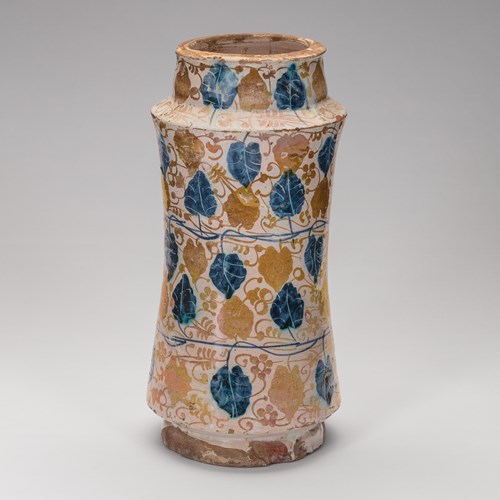Marketplace
Study of Fantail in Peach Tree
In the late 18th and early 19th centuries, several watercolour albums were commissioned by members of the East India Company stationed accross Asia. Painted by local artists, they were sent back to Europe as souvenirs-cum-scientific studies.
Whilst the purpose of these paintings was to document the fauna and flora encountered by Europeans, this example does not correspond directly with any East Asian bird. The markings bear a resemblance to certain members of the wagtail family (Motacilladae), notably the white-browed wagtail. However, the long slender tail of the wagtail, in contrast to the splayed tail of the depicted bird, rules out this possibility. Rather, it may be a member of the genus Rhipiduridae, known colloquially as fantails due to their distinctive tails.
Though it is a highly detailed painting, with fine brush strokes creating the texture of feathers and stippling giving shape to the peaches, there is something rather unnatural about the composition. This style resembles certain paintings in The William Farquhar Collection of Natural History Drawings in the National Museum of Singapore, such as a the study of a black and red broadbill (accession no. 1995-03227) or the study of a sonneratia (accession no. 1995-02970). This collection was commissioned by the colonial administrator William Farquhar and painted by unknown Chinese artists in Malacca and Singapore between 1819 and 1823. Like the present example, many of the species depicted in the collection have been difficult to identify.
Whilst the purpose of these paintings was to document the fauna and flora encountered by Europeans, this example does not correspond directly with any East Asian bird. The markings bear a resemblance to certain members of the wagtail family (Motacilladae), notably the white-browed wagtail. However, the long slender tail of the wagtail, in contrast to the splayed tail of the depicted bird, rules out this possibility. Rather, it may be a member of the genus Rhipiduridae, known colloquially as fantails due to their distinctive tails.
Though it is a highly detailed painting, with fine brush strokes creating the texture of feathers and stippling giving shape to the peaches, there is something rather unnatural about the composition. This style resembles certain paintings in The William Farquhar Collection of Natural History Drawings in the National Museum of Singapore, such as a the study of a black and red broadbill (accession no. 1995-03227) or the study of a sonneratia (accession no. 1995-02970). This collection was commissioned by the colonial administrator William Farquhar and painted by unknown Chinese artists in Malacca and Singapore between 1819 and 1823. Like the present example, many of the species depicted in the collection have been difficult to identify.
More artworks from the Gallery









